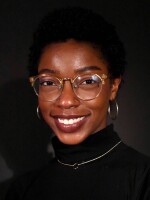The sounds of nature and the spoken word intermingled during a special performance Saturday at the Cleveland Botanical Garden featuring the 24th Poet Laureate of the United States, Ada Limón .
Limón and four Northeast Ohio poets read from their work and discussed the relationship between science and poetry.
"Poetry and science are deeply connected because they begin with the questions, they begin wonders, they begin curiosity," Limón said. "They intertwine in a way that feels as if they've always meant to be together."
Limon developed an appreciation for nature when she was around six years old, she said, and the theme has woven its way through much of her poetry since then.
"I have always loved nature," Limón said. "I was raised by a lot of people who believe that the natural world were part of our families, and so I think that it began very early on for me, my connection with nature."
Environmentalism and climate change may not be a topic of interest for every poet, Limón said, but poetry can offer a unique perspective on the issues.
"We are built on attention, and so the more we pay attention, the more we look, the more notice, the more attached we are to this world, and the more we are likely to become better stewards of this world," she said. "We are very well suited for helping to bring awareness to the climate crisis because we are the watchers. The same way that scientists are, and biologists and botanists."
Limón says she hopes her poetry inspires people to see both the connection between arts and sciences and the shared responsibility to care for the planet.
Case Western Reserve University's Baker-Nord Institute for the Humanities organized the event with the Botanical Garden.
The goal is to provide a collaborative, creative environment to discuss the intersections of nature and art from a variety of perspectives, Baker-Nord Institute Director Michele Berger said.
"Each of the respective units was interested in sparking curiosity about how people interact with the natural world," Berger said, "and allowing people to come at the topic from multiple lenses, humanities, social sciences to some degree and also science just provided a unique opportunity for people to engage."
Another poet who lives in Cleveland, Jason Harris, read several of his poems that explore the human impact on the environment. The poems highlight a genre called eco-poetry, he said.
Environmentalism and climate change may not be a topic of interest for every poet, but poetry can offer a unique perspective on the issues.Ada Limón, Poet Laureate of the United States
"Think about you have this open field, lots of green, lots of trees, birds chirping, rabbits hopping, and then a little bit over to like the left or the right of that field is an excavator getting ready to dig into the ground," Harris said. "Eco-poetry ... it's the intermingling between humanity and nature, where unfortunately nature always gets the shorter end of the stick because of humanity," he said.
Harris says eco-poetry gives him the opportunity to appreciate the resources nature has to offer, and what life might be like if they didn’t exist.
"I know that at one point, something may no longer be here, myself included. which is why I like to write poetry," he said. "I wanted to create a catalog of things that were also here during the same time that I was.



